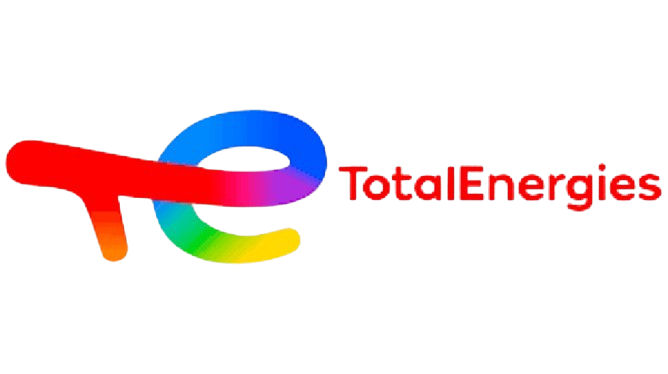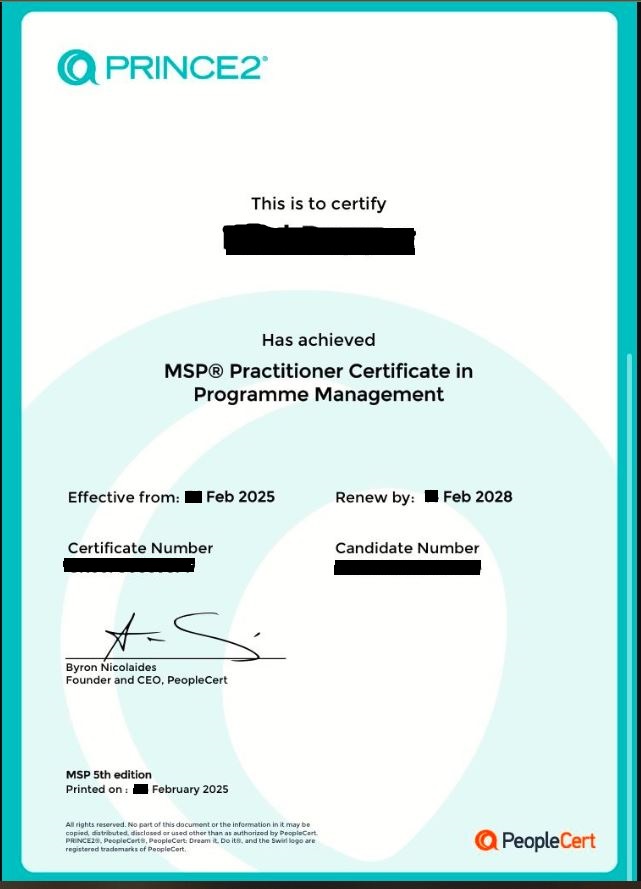Course Features & Benefits – MSP Practitioner Training in Casis
Why Casis Professionals Gain with ScholarAcad MSP Practitioner Training
1. Module: Overview & Principles
- The Programme Environment
- Programme Scaling
- The Programme Mandate
- The Vision Statement
- The Programme Blueprint
- Programme Processes Flow
- Programme Management Roles
2. Module: Identifying & Programme
- The Mandate and Programme Brief
- The Vision Statement
3. Module: Stakeholder Management
- Identification and Analysis
- The Stakeholder Map
- Communication Strategy
- The Communication Plan
- Communication Channels
4. Module: Defining a Programme
- Programme Definition
- Use of the Blueprint
- Business Strategy Flow
- The Programme Business Case
- Quality Management Strategy
- The Programme and Financial Plan
5. Module: Issue Risk & Management
- The Issue Log
- Programme and Project Issues
- Programme Risks
- Risk Management Strategy
- The Risk Log and Risk Responsibilities
6. Module: Benefits Management
- Definition and Process
- The Vision Statement and Blueprint
- Direct and Indirect Benefits
- Benefits Management Strategy
- The Benefits Plan and Benefits Profiles
- Programme Benefit Reviews
7. Module: Establishing Programme
- Programme Activities
- Results, decisions and responsibilities
8. Module: Organization
- Programme Management Roles
- Tailoring and Linked Roles
- Organisational Structure
- The Programme Director and Manager
- The Business Change Manager
- The Programme Support Office and Programme Assurance
9. Module: Quality and Configuration Management
- Quality Management
- Quality Management Strategy
- Responsibilities for Quality
- Configuration Management
- Change Control and Audit
10. Module: Managing the Portfolio
- Purpose
- The Project Portfolio activities
11. Module: Delivering Benefits
- Benefits Management
- Benefits Management Strategy
- The Blueprint
- Benefits Plan and Benefit Profiles
12. Module: Closing a Programme
- Blueprint and Benefits Plan and Profiles
- Benefits Management Strategy
View More
Target Professionals of MSP Practitioner Program Casis

Admission Requirements for MSP Practitioner Certification Candidate Eligibility Casis
Accessible to all, no prior qualifications required
Ideal starting point for Program management skills
Course covers MSP principles, themes, and processes
MSP® Foundation Certification is a prerequisite for the MSP® Practitioner examination. Both certifications are included in this course.

MSP Practitioner Among Highest Paying Casis





















MSP Practitioner Training Course Delivery Option for Casis
Thu
Fri
09:00 - 17:00 (EET)
- # QSYH5JU93120
- English (Language)
- Exam Voucher + Practice Test
Sat
Sun
09:00 - 17:00 (EET)
- # QSYH5JU46120
- English (Language)
- Exam Voucher + Practice Test
Thu
Fri
09:00 - 17:00 (EET)
- # QSYH5JU5D120
- English (Language)
- Exam Voucher + Practice Test
Sat
Sun
09:00 - 17:00 (EET)
- # QSYH5JU5B120
- English (Language)
- Exam Voucher + Practice Test
Mon
Tue
09:00 - 17:00 (EET)
- # QSYH5JU3B120
- English (Language)
- Exam Voucher + Practice Test
21-Day Roadmap to MSP Practitioner Certification Exam Success: Casis

Familiarize yourself with the MSP® Practitioner exam structure, content outline, and topics covered by PeopleCert.
Secure 16 hours of instructor-led training based on the MSP® 5th Edition manual.
Create a structured study plan that outlines your daily or weekly study schedule, key MSP® 5th Edition topics, and certification goals.
Collect essential MSP® study materials such as the official MSP® 5th Edition manual, training manual
Employ active learning techniques like flashcards, mind maps, and teaching concepts to others to enhance understanding and retention of MSP® principles and governance themes.
Practice taking the MSP® Practitioner exam under simulated conditions using complimentary mock tests.
Receive dedicated After Training support for exam preparation from your provider.
Solidify your tech understanding with MSP Practitioner Certification Casis

View More
Casis MSP Practitioner: Alumni Achievements Highlighted
The PMP course in Casis offered profound insights into adaptive life cycles and tailoring project approaches. It's perfect for complex, evolving projects.

Casis’ PMP program was excellent in its coverage of resource requirements planning and optimizing team utilization. This directly impacts project efficiency.

PMP in Casis truly shined in its explanation of risk categories and continuous risk assessment. I feel much better prepared to anticipate and address challenges.

Learning Objectives
General Frequently Asked Questions
1. What is MSP Practitioner certification?
The MSP® (Managing Successful Programmes) Practitioner certification is the next level after MSP Foundation. It demonstrates that you can apply and tailor the MSP framework to specific, real-world programme management scenarios. While Foundation tests your knowledge of the concepts, Practitioner assesses your ability to apply that knowledge effectively in a programme environment.
2. How to prepare for the MSP Practitioner exam?
Preparation for the MSP Practitioner exam requires a deeper understanding than the Foundation level. Key steps include:
Thoroughly study the MSP manual: The Practitioner exam is open-book, but you need to know the manual inside out to navigate it efficiently. Tab and annotate your manual for quick reference.
Focus on application, not just memorization: The exam tests your ability to apply MSP principles and themes to scenarios.
Practice with scenario-based questions and case studies: This is crucial as the exam uses objective testing with complex scenarios.
Attend an accredited training course: While self-study is possible, an ATO course provides valuable insights, practical exercises, and guidance on exam techniques.
Time management: Practice answering questions within the time limit, especially the more complex assertion/reason or multiple-response questions.
3. What is the format of the MSP Practitioner exam?
The MSP Practitioner exam has the following format:
Question type: Objective testing, which includes multiple-choice, multiple-response, matching, and assertion/reason questions, often based on a provided scenario.
Number of questions: 70 questions.
Passing score: 42 marks out of 70 (60% correct).
Duration: 150 minutes (2.5 hours).
Open book/closed book: It is an open-book exam, allowing you to refer to the official printed hard copy of the Managing Successful Programmes (MSP®) 5th Edition manual. No loose-leaf notes or sticky notes containing additional material are allowed.
4. What are the benefits of MSP Practitioner certification?
Benefits of MSP Practitioner certification include:
Enhanced programme management skills: Develops the ability to apply a robust, globally recognized framework to complex change initiatives.
Improved career prospects: Demonstrates a high level of expertise in programme management, making you more attractive to employers.
Effective delivery of transformational change: Equips you with the knowledge to manage programmes that deliver significant organizational outcomes and benefits.
Strategic alignment: Helps you understand how programmes align with organizational strategy and contribute to business objectives.
Better decision-making: Provides a structured approach for problem-solving, risk management, and stakeholder engagement within a programme context.
5. What is the difference between MSP Foundation and Practitioner?
MSP Foundation: Focuses on understanding the MSP framework. It verifies knowledge of the principles, governance themes, and transformational flow. It's suitable for informed members of a programme team.
MSP Practitioner: Focuses on applying the MSP framework. It tests the ability to tailor and use the principles, themes, and processes in real-world scenarios. It's aimed at those who will actively manage or play a significant role in programmes.
6. What are the prerequisites for MSP Practitioner certification?
The prerequisite for the MSP Practitioner exam is that you must have successfully passed the MSP® Foundation Exam. Your examination results will be withheld until verified proof of this prerequisite is provided.
7. How is MSP Practitioner applied in real-world scenarios?
MSP Practitioner knowledge is applied in real-world scenarios by:
Tailoring the framework: Adapting MSP principles and processes to suit the specific context, complexity, and culture of a programme and organization.
Developing key programme documents: Creating and refining the Vision, Blueprint, Business Case, Benefits Realization Plan, and other programme management products.
Managing governance: Establishing and maintaining appropriate governance structures, roles, and responsibilities.
Engaging stakeholders: Effectively identifying, analyzing, and engaging with diverse stakeholders throughout the programme lifecycle.
Addressing risks and issues: Proactively identifying, assessing, and managing programme-level risks and issues.
Realizing benefits: Focusing on identifying, tracking, and ensuring the realization of measurable benefits from the programme's outcomes.
8. Are there free MSP Practitioner sample questions or practice exams available?
Yes, similar to the Foundation level, you can find free MSP Practitioner sample papers and practice questions online. Accredited Training Organizations (ATOs) often provide these as part of their course materials or on their websites. Searching for "MSP Practitioner sample exam" or "MSP Practitioner practice questions" will help you locate resources. Ensure they are for the current 5th Edition of MSP.
9. What is the typical salary increase or career impact after MSP Practitioner?
While specific salary increases vary widely based on location, industry, experience, and the organization, MSP Practitioner certification generally enhances your marketability and earning potential in programme management roles. It positions you as a professional capable of handling complex change initiatives. Many organizations actively seek programme managers with this qualification. It demonstrates a commitment to best practices and can lead to more senior or strategic programme roles.
10. What is the cost of MSP Practitioner course and exam?
he cost of an MSP Practitioner course and exam varies significantly depending on:
Training provider: Different Accredited Training Organizations (ATOs) have different pricing structures.
Course format: Classroom-based, virtual instructor-led, and self-paced online courses will have different price points.
Location: Costs can vary by country or region.
Included materials: Some courses include the official manual and practice exams, while others might charge extra.
It's advisable to research different ATOs and their offerings to find a package that suits your budget and learning style.
View More
View More
View More
View More
View More
View More
Casis: A Hub for Technology, Learning, and Careers
Cēsis is a town in Latvia, known for its strong connection to global tech companies and innovation hubs. It is a hub for startups and innovation, particularly in areas like IoT, AI, and cybersecurity.
Key Locations
- Cēsis Tech Hub : A hub for startups and innovation focused on IoT, AI, and cybersecurity.
- Proximity to Riga : Access to global tech firms drives innovation.
Why These Skills Are in Demand
Cēsis’s tech sector is driven by its proximity to Riga and its focus on IoT, AI, and cybersecurity. Key skills in Project Management, Service Delivery, Agile, DevOps, and SAFe Agile are essential.
- Project Management : Managing complex projects, such as IoT-driven supply chain solutions, requires methodologies like SAFe Agile to ensure alignment and efficiency.
- Service Delivery : Protecting critical systems in government, defense, and telecommunications is vital. As Cēsis expands its digital infrastructure, professionals skilled in ITIL ensure seamless service delivery.
- Agile : Enhancing collaboration between developers and operators accelerates software deployments. Tools like GitLab and Trello are widely used to support Agile workflows.
- DevOps : Enhancing collaboration between developers and operators accelerates software deployments
Need More Information ?
Have more questions or need personalized guidance ?

Top Companies in Casis Hiring Managing Successful Programmes (MSP®) Practitioner Professionals in 2025
| Company Name | Role | Job Description | Job Link |
|---|---|---|---|
| Cesis City Council | Project Coordinator | Cesis City Council seeks a Project Coordinator to manage cultural development projects. Using PRINCE2 7 Foundation skills, you’ll oversee planning, execution, and closure of civic initiatives. Responsibilities include stakeholder communication, risk management, and resource coordination. PRINCE2 methodologies ensure controlled project stages, enhancing efficiency. You’ll work with cultural teams to promote Cesis’s heritage. Strong organizational skills and project management software proficiency are required. PRINCE2 certification ensures timely and budget-compliant outcomes. Join Cesis City Council to drive cultural growth through structured project management. | Job Link |
| Cesu Alus | Assistant Project Manager | Cesu Alus in Cesis is hiring an Assistant Project Manager to support brewery projects. With PRINCE2 7 Foundation training, you’ll assist in defining project scopes, managing timelines, and mitigating risks. Your role involves coordinating with production teams to ensure quality deliverables. PRINCE2 skills ensure structured project execution, optimizing efficiency. Strong analytical and communication skills are essential, along with familiarity with project tools. PRINCE2 certification enhances your ability to control project variables. Join Cesu Alus to drive beverage innovation through effective project management. | Job Link |
| Latvenergo | Project Analyst | Latvenergo in Cesis seeks a Project Analyst to support energy projects. Leveraging PRINCE2 7 Foundation skills, you’ll analyze project data, track performance, and ensure scope adherence. Your role includes risk identification, stakeholder reporting, and process optimization using PRINCE2 frameworks. You’ll collaborate with technical teams to advance energy solutions. Strong analytical skills and project management software proficiency are required. PRINCE2 training ensures controlled delivery, enhancing efficiency. Join Latvenergo to contribute to energy innovation through data-driven project management. | Job Link |
| TietoEVRY | Project Management Officer | TietoEVRY in Cesis seeks a Project Management Officer to oversee IT projects. With PRINCE2 7 Foundation training, you’ll manage project governance, ensuring compliance with timelines and budgets. Your role involves risk assessment, stakeholder engagement, and progress reporting using PRINCE2 methodologies. You’ll coordinate with tech teams to deliver innovative software solutions. Strong organizational skills and project management tool proficiency are essential. PRINCE2 frameworks ensure structured delivery, enhancing project success. Join TietoEVRY to drive digital innovation through disciplined project management. | Job Link |
| LatvianTech Cesis | DevOps Engineer | LatvianTech Cesis is seeking a DevOps Engineer to enhance our software delivery processes. You’ll build and maintain CI/CD pipelines using Jenkins and Docker, ensuring seamless application deployments. Responsibilities include managing AWS infrastructure, automating provisioning with Terraform, and orchestrating containers with Kubernetes. You’ll monitor system performance using Prometheus and Grafana, addressing scalability challenges. Candidates need 3+ years of DevOps experience, proficiency in Python or Bash, and familiarity with Agile workflows. You’ll collaborate with development teams to integrate DevOps practices, ensuring high-quality software delivery. Knowledge of security frameworks is a plus. Based in Cesis, this role offers opportunities to work on innovative tech projects in a collaborative environment. Strong problem-solving and communication skills are essential. Join LatvianTech Cesis to contribute to cutting-edge solutions. | Job Link |



